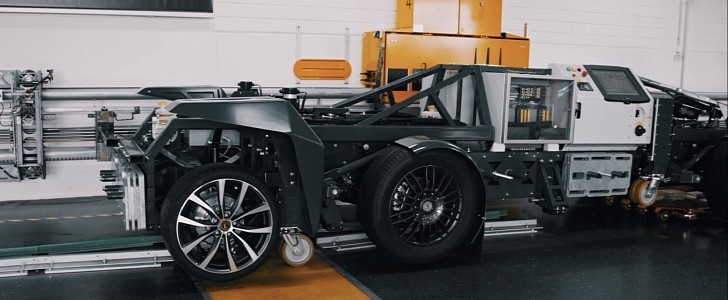Continental has developed a fully electric test vehicle to measure the braking performance of its passenger car tires and it boasts of it being unique and cutting edge, helping the company use one of the most advanced and precise tire braking test methods in the world.
The vehicle is called AVA, which stands for Analytic Vehicle AIBA (Automated Indoor Braking Analyzer) and it helps the German tire manufacturer conduct fully automated tests and accurately monitor the frictional properties of the tires during braking maneuvers. Both dry road and wet road scenarios are reproduced and the test method is independent of the car’s model and its specific characteristics.
Packing two electrically driven axles powered by a high-performance battery, the AVA can deliver high torque and maintain a constant speed. It uses Continental’s Brake-by-Wire technology for the integrated braking system, ensuring a quick and accurate bake response.
The testing of the tire’s performance in various scenarios is of paramount importance to ensure the safety of the vehicle, which is why Continental says it analyzes its tires as precisely as possible. First, the AVA is accelerated to a speed of 65 kph (40 mph) using an electromagnetic linear drive, after which multiple braking tests are conducted, measuring all the forces that act between the tire and the road surface during braking.
Continental uses its state-of-the-art testing vehicle/technology in the aforementioned AIBA, with the weather-independent facility boasting a test hall that is 350 m (1,148 ft) long and 30 m (98.4 ft) wide. There are up to five road surfaces that can be exchanged hydraulically. Up to 100,000 braking tests can be carried out every year on the 75m (246 ft) test track on dry, wet, and even icy “roads”.
The German automotive parts manufacturing company also claims that all new Continental tire models are run for the equivalent of 25 million kph (15.5 million mph) on testbeds and test tracks, which “corresponds to 625 times around the world.”
Packing two electrically driven axles powered by a high-performance battery, the AVA can deliver high torque and maintain a constant speed. It uses Continental’s Brake-by-Wire technology for the integrated braking system, ensuring a quick and accurate bake response.
The testing of the tire’s performance in various scenarios is of paramount importance to ensure the safety of the vehicle, which is why Continental says it analyzes its tires as precisely as possible. First, the AVA is accelerated to a speed of 65 kph (40 mph) using an electromagnetic linear drive, after which multiple braking tests are conducted, measuring all the forces that act between the tire and the road surface during braking.
Continental uses its state-of-the-art testing vehicle/technology in the aforementioned AIBA, with the weather-independent facility boasting a test hall that is 350 m (1,148 ft) long and 30 m (98.4 ft) wide. There are up to five road surfaces that can be exchanged hydraulically. Up to 100,000 braking tests can be carried out every year on the 75m (246 ft) test track on dry, wet, and even icy “roads”.
The German automotive parts manufacturing company also claims that all new Continental tire models are run for the equivalent of 25 million kph (15.5 million mph) on testbeds and test tracks, which “corresponds to 625 times around the world.”






